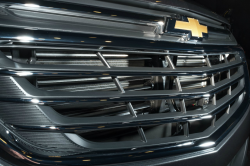
— Chevrolet Equinox oil consumption issues are being debated in court as the plaintiffs in a class-action lawsuit try to convince the judge not to dismiss the lawsuit.
Plaintiff James Andrews says he purchased a used 2012 Chevrolet Equinox with 65,551 miles on the odometer in January 2017 from a used car dealer.
About two weeks later, he “noticed his vehicle would start to subtly rock back and forth while coming to a stop” and he “started hearing a knocking noise” described as “spark knock” that allegedly worsened by late February 2017.
Andrews claims a mechanic allegedly found over a third of the oil had already been consumed despite driving only 1,000 miles. The mechanic also found a technical service bulletin about the Equinox, so the plaintiff contacted General Motors directly and was told he would receive an extended warranty if the Equinox was consuming more than one quart of oil per 2,000 miles.
The extended warranty would "extend his warranty to remedy the issue within 7 years and 6 months of the date the vehicle was originally placed in service or 120,000 miles.”
Andrews said he went to a GM dealership but admitted he didn't allow technicians to test the oil consumption rate to determine if the SUV was eligible for free repairs. GM says the SUV is still within the period for the extended warranty, but instead of taking advantage of the program, Andrews decided to file the lawsuit.
The plaintiffs claim 2010-2017 Equinox SUVs have design and/or manufacturing defects involving the low-tension oil rings in the engines that allegedly do not apply “sufficient tension to prevent oil from being consumed in the combustion chamber, which in turn fouls spark plugs, and creates harmful carbon buildup in the pistons and cylinders.”
The lawsuit also alleges the engines “vaporizes the cylinder wall oil film, pushing it past the rings and into the crankcase where it is vacuumed into the intake manifold via the positive crankcase ventilation (PCV) system.”
According to the plaintiffs, the Equinox engines spray oil onto the piston skirts and cylinder walls and overloads and fouls the defective piston rings, forcing oil past the piston rings into other places in the engine.
This allegedly results in carbon buildup that blocks the ability to seal out oil. The rings then allegedly fall apart after they “lose proper groove seating [and] become misaligned with the cylinder bores." And the oil monitoring systems allegedly don't adequately warn drivers of low oil levels which leads to failures of the engines.
GM says the plaintiffs never allege that anyone has ever experienced a crash or been injured because of oil consumption problems. The automaker also says the lawsuit alleges the engines can overheat and catch fire, but GM points out how the plaintiffs can't name any incidents blamed on oil consumption.
Attorneys for GM say the oil consumption issues are or were fully covered by the powertrain warranties and also covered by extended warranties for 2010-2012 Equinox SUVs. The extended warranty, which General Motors calls the GM Special Coverage Adjustment, extended powertrain coverage by offering free replacements of pistons and piston rings.
GM says instead of taking advantage of the available coverages, some Equinox owners filed the class-action lawsuit that alleges the SUVs have “one or more design and/or manufacturing defects” that cause them “to consume abnormally high amounts of oil (the ‘Oil Consumption Defect’).”
In its motion to dismiss the lawsuit, GM says the plaintiffs’ express warranty claims fail because GM’s warranty only covers “defects related to materials and workmanship,” not the design defects alleged by plaintiffs. Additionally, the plaintiffs don't allege they requested testing or eligible repairs within the extended warranty coverage periods.
GM further argues the lawsuit never alleges an unreasonable safety hazard or that the automaker had a pre-sale duty to disclose the alleged oil consumption issues. The plaintiffs also allegedly fail to plausibly show GM knew about the alleged oil consumption issues at the time it was marketing and selling the SUVs.
According to the automaker, the plaintiffs do not adequately plead that GM concealed the alleged problems, and implied warranty claims fail for multiple reasons.
Three of the named plaintiffs allegedly purchased their used SUVs from third parties which makes implied warranty claims baseless, and two additional plaintiffs have no factual basis for claims the oil consumption problems made their new SUVs unmerchantable during the one-year implied warranty period.
In addition, all implied warranty claims allegedly fail because the plaintiffs didn't file the lawsuit within four years of the SUVs being sold as new.
Lawyers for GM argue claims the automaker actively concealed the alleged defect don't add up. GM says the plaintiffs try to support their allegation of concealment by listing complaints from Equinox owners that allegedly show the automaker knew about the oil consumption issues before the plaintiffs purchased their SUVs.
GM told the judge out of the 22 complaints posted on the website of the National Highway Traffic Safety Administration, 20 were not posted until March 2017 or later, which was after all five plaintiffs had purchased their vehicles.
According to GM's motion to dismiss, the other 21 complaints in the lawsuit were posted on CarComplaints.com after the initial new retail sale of all but two plaintiffs' SUVs.
The Chevrolet Equinox oil consumption class-action lawsuit was filed in the U.S. District Court for the Northern District of California - James Andrews and Ryan Hindsman, et al., v. General Motors LLC.
The plaintiffs are represented by Ahdoot & Wolfson, P.C., Greg Coleman Law, and Whitfield, Bryson & Mason LLP.
CarComplaints.com has Chevy Equinox complaints about oil consumption issues:




